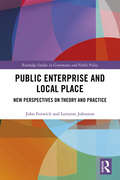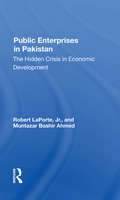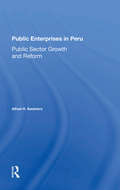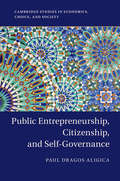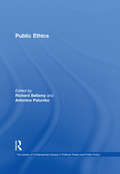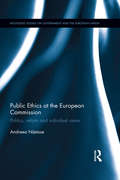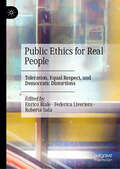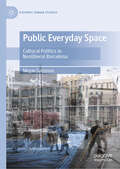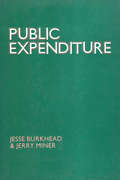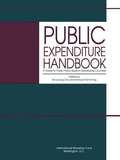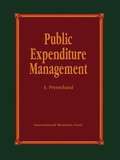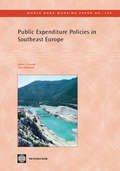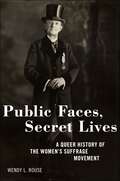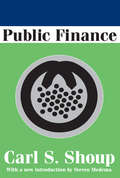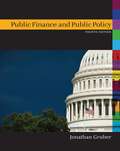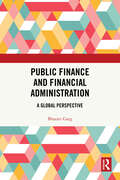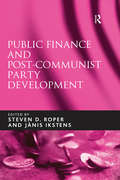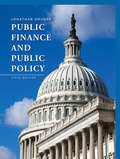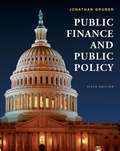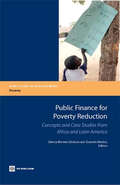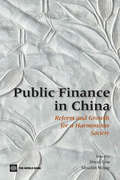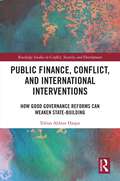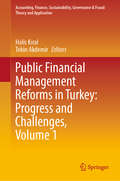- Table View
- List View
Public Enterprise and Local Place: New Perspectives on Theory and Practice (Routledge Studies in Governance and Public Policy)
by John Fenwick Lorraine JohnstonThis book presents the key interactions in local government and public enterprise, drawing together the challenges for local governance in the practice of public entrepreneurship and its response to collaboration, place and place making. Specifically, this book includes the impact of local partnerships and public entrepreneurs in local policy implementation. It is written by established authors bringing together their experience and practice of local partnerships and public entrepreneurship in place-based strategies, and will be of value to local government, new forms of enterprise partnerships, wider agencies and public entrepreneurship scholars as well as policymakers responsible for implementation of place-based regeneration. This text will be of key interest to students, scholars and practitioners in public administration, business administration, local government, entrepreneurship, public sector management and more broadly to those with interests in public policy, business and management, political science, economics, urban studies and geography.
Public Enterprises In Pakistan: The Hidden Crisis In Economic Development
by Robert Laporte Muntazar Bashir AhmedThis book contains a study of the economics and management of public enterprises in Pakistan. It examines their performance, organizational behavior, relationships with other government organizations outside of the sector, and the issues that confront the public enterprise sector and the government.
Public Enterprises In Peru: Public Sector Growth And Reform
by Alfred H SaulniersThis book helps fill the void in teaching materials about the Latin American public sector. It began as two case studies of public enterprises jointly carried out by the Office for Public Sector Studies of the University of Texas at Austin, which the author directed, and the Universidad del Pacifico in Lima. Over the years, the cases expanded into
Public Entrepreneurship, Citizenship, and Self-Governance (Cambridge Studies in Economics, Choice, and Society)
by Paul Dragos AligicaIn this book Paul Dragos Aligica revisits the theory of political self-governance in the context of recent developments in behavioral economics and political philosophy that have challenged the foundations of this theory. Building on the work of the 'Bloomington School' created by Nobel Laureate Elinor Ostrom and Public Choice political economy co-founder Vincent Ostrom, Aligica presents a fresh conceptualization of the key processes at the core of democratic-liberal governance systems involving civic competence and public entrepreneurship. The result is not only a re-assessment and re-articulation of the theories constructed by the Bloomington School of Public Choice, but also a new approach to several cutting-edge discussions relevant to governance studies and applied institutional theory, such as the debates generated by the recent waves of populism, paternalism and authoritarianism.
Public Ethics (The Library of Contemporary Essays in Political Theory and Public Policy)
by Antonino PalumboPolitical realists are accustomed to argue that ethical considerations have no place in public affairs. This is always a debatable view: realism habitually employs a crude utilitarian morality rather than being totally amoral, and ethical considerations have continued to play an ever more prominent role in the thinking and actions of policy makers and politicians. In addition, citizens increasingly expect policies not only to be efficient and effective according to some purely economic or prudential calculation, but also to be equitable and just as well. As a consequence, both the public and private morality of politicians and public officials has come under ever greater scrutiny. The essays collected together in this volume explore the ethical issues raised by the process and substance of policy-making, and discuss whether it is reasonable to expect ethical standards in public affairs.
Public Ethics at the European Commission: Politics, Reform and Individual Views (Routledge Studies on Government and the European Union)
by Andreea NastaseSince the early 2000s, reforms in the area of public ethics have represented a significant part in the European Commission's efforts to improve its internal governance and democratic legitimacy, and address the crisis of public confidence in European integration. This book comprises a study of ethics and public integrity issues in the administrative services of the European Commission. The author traces the reforms implemented in this area since the early 2000s, and asks whether and how they have shaped Commission officials’ thinking about appropriate behaviour in public office. Based on in-depth interviews and the use of vignettes, the book reveals that the influence of ethics regulations is subtle and full of contradictions: while a heightened awareness and discussion of ethical issues exists in the Commission nowadays, the topic is nonetheless often considered as a matter of "common sense". This book breaks new ground as the first analysis of ethics at the level of individual EU officials. It advances a new angle to the study of the Commission as an administrative actor, and sheds light on an important but under-researched component of its efforts to address criticism concerning democratic legitimacy. In the field of administrative ethics, the book tackles research gaps regarding the practice and impact of ethics policies within public organizations. This text will be of key interest to scholars, students and practitioners of EU Studies/Politics, institutional reform, administrative ethics, and more broadly European governance and public policy.
Public Ethics for Real People: Toleration, Equal Respect, and Democratic Distortions
by Federica Liveriero Enrico Biale Roberta SalaThis book develops an innovative paradigm of public ethics that provides a unique insight into three central themes – recognition, social conflicts and democratic distortions – while critically celebrating the work of Anna Elisabetta Galeotti. In honor of her seventieth birthday, this edited collection brings together leading scholars in the field of normative political philosophy to reason upon the main strands of her research. The volume envisages a general paradigm of public ethics to deal with social conflicts that involve structural dynamics and deliberative deficits. While addressing diverse yet interrelated topics, all the contributors demonstrate a commitment to the ideal that, in the construction and reform of social and political institutions, respect for individuals as the makers of their own lives should act as the guiding principle. Against this backdrop, this volume strikes a difficult-to-reach balance between refined theorizing over classical themes of the liberal tradition and the ability to open these classic themes to new strands of research. The collection deals with crucial contemporary challenges to the democratic order, such as democratic backsliding and the breach of social trust, legal and democratic fights over free speech, multicultural clashes in highly diverse societies, and reparation for historical wrongs.
Public Everyday Space: Cultural Politics in Neoliberal Barcelona (Hispanic Urban Studies)
by Megan SaltzmanThis book explores how everyday practices in public space (sitting, playing, walking, etc.) challenge the increase of top-down control in the global city. Public Everyday Space focuses on post-Olympic Barcelona—a time of unprecedented levels of gentrification, branding, mass tourism, and immigration. Drawing from examples observed in public spaces (streets, plazas, sidewalks, and empty lots), as well as in cultural representation (film, photography, literature), this book exposes the quiet agency of those excluded from urban decision-making but who nonetheless find ways to carve out spatial autonomy for themselves. Absent from the map or postcard, the quicksilver spatial phenomena documented in this book can make us rethink our definitions of culture, politics, inclusion, legality, architecture, urban planning, and public space.
Public Expenditure
by S.S. StevensIn all highly industrialized countries public expenditures are a substantial and growing share of total economic activity. The authors integrate normative and positive theory and empirical analysis of public expenditure, concentrating on the optimal provision of public goods and the estimation of their costs and effects. This volume emphasizes the techniques that are available for reaching collective decisions about the provision of public goods and stresses the importance of income distribution and intergovernmental fiscal relations. In a mixed economy, where the public sector is growing faster than the private sector, the nature of public expenditures must be closely evaluated and studied. This book is designed to focus on and delineate controversies about public expenditure--to define what it is, analyze its function, show how it operates, and finally to evaluate research on this important subject.The book considers the theories of leading economists (Kenneth Arrow, Lionel Robbins, Carl Shoup, James Buchanan, Paul Samuelson, Richard Musgrave, and others) in arriving at a clear statement of theory in its application to operational problems. Appropriate attention is paid to current techniques such as program budgeting, cost-benefit analysis, and the analysis of the determinants of public expenditure. The book is unique in its emphasis on the integration and critique of contemporary theories of public expenditure, of distributional concerns, and of the political framework of public expenditure decisions. It provides a necessary resource for professional economists required to deal with public expenditure problems in research or practice.
Public Expenditure Handbook
by Richard Hemming Ke-Young ChuA report from the International Monetary Fund.
Public Expenditure Management in Francophone Africa: A Cross-Country Analysis
by Yaya MoussaA report from the International Monetary Fund.
Public Expenditure Policies in Southeast Europe
by Satu Kahkonen Ivailo V. IzvorskiThe countries of Southeast Europe have undergone a significant transition over the past decade. Helped by macroeconomic stabilization and efforts in advancing structural reforms, real GDP growth has picked up this century. Fiscal adjustment has been an integral part of the transition. Expenditure cuts have helped trim spending relative to GDP in most countries in the region and cut fiscal deficits everywhere except in Serbia. Progress in fiscal consolidation has been substantial, but in several of the countries the government's presence in the economy remains oversized. Costs related to advancing EU integration and completing reforms are expected to generate further pressures for public spending. Creating the fiscal space for addressing such pressures would require a further reduction in existing spending, given that there is still scope for increasing tax rates. The report identifies key remaining challenges and proposes a menu of options in further reforms in sectors that account for the largest shares of public spending, and where reforms are likely to have significant budgetary implications. The sectors discussed in the report are social protection, health, education, public administration, and infrastructure.
Public Faces, Secret Lives: A Queer History of the Women's Suffrage Movement
by Wendy L. RouseHonorable Mention for the 2023 Francis Richardson Keller-Sierra Prize2023 Judy Grahn Award-Publishing Triangle FinalistRestores queer suffragists to their rightful place in the history of the struggle for women’s right to voteThe women’s suffrage movement, much like many other civil rights movements, has an important and often unrecognized queer history. In Public Faces, Secret Lives Wendy L. Rouse reveals that, contrary to popular belief, the suffrage movement included a variety of individuals who represented a range of genders and sexualities. However, owing to the constant pressure to present a “respectable” public image, suffrage leaders publicly conformed to gendered views of ideal womanhood in order to make women’s suffrage more palatable to the public.Rouse argues that queer suffragists did take meaningful action to assert their identities and legacies by challenging traditional concepts of domesticity, family, space, and death in both subtly subversive and radically transformative ways. Queer suffragists also built lasting alliances and developed innovative strategies in order to protect their most intimate relationships, ones that were ultimately crucial to the success of the suffrage movement. Public Faces, Secret Lives is the first work to truly recenter queer figures in the women’s suffrage movement, highlighting their immense contributions as well as their numerous sacrifices.
Public Finance (Social And Economic Studies Of Post-war France Ser.)
by Carl ShoupBroad in scope and carefully balanced in emphasis, this book is a major treatise on the theory and practice of public finance. It is unique in its presentation of a worldwide perspective and in its treatment of both the instruments of public finance and the goals, effects, and criteria of public finance measures. The book is divided into three parts. Book One defines the field, specifies the possible meaning of the "effects" of a public finance measure, and describes the criteria by which these measures are commonly appraised.Book Two is concerned with micro public finance and opens with a discussion of the theory of public goods in general. Each of the major free government services and types of transfer payments as well as the taxes that government employs are then examined. This section concludes with a chapter on the relevant aspects of government borrowing and inflationary finance. Book Three considers the major goals of public finance policy and describes how the various instruments described in Book Two can be used in achieving these goals. Among the topics treated are the use of appropriate instruments to resolve conflict in goals, conceptual problems of measuring the public finance sector and its maximum and minimum economic limits, consensus goals of equity full employment and Pareto-optimism use of resources, and goals that evoke conflicts of interest within any community.
Public Finance And Public Policy 4th Ed
by Jonathan GruberJonathan Gruber's groundbreaking Public Finance and Public Policy was the first textbook to truly reflect the way public policy is created, implement, and researched. Like no other text available, it integrated real-world empirical work and coverage of transfer programs and social insurance into the traditional topics of public finance. From its first edition, the book quickly became the market-leading text for Public Finance and Public Policy courses, and the margin is growing. Thoroughly updated, this timely new edition gives students the basic tools they need to understand the driving issues of public policy today, including healthcare, education, global climate change, entitlements, and more.
Public Finance and Financial Administration: A Global Perspective
by Bharati GargThis book offers a comprehensive exploration of different aspects of public finance and its administrative practices across different countries. Based on a comprehensive review of existing literature, it combines theoretical exploration and practical case studies of developed and developing countries. Part I of this volume provides a basic understanding of the concept of public finance. Part II examines the role of budget with a detailed discussion of budgetary cycles in the U.S.A., Brazil, and India. It also provides an in-depth coverage of performance budgeting practices, focusing on the OECD countries. Part III focuses on intergovernmental federal fiscal relations with a special focus on India, along with the Ministries of Finance in the U.S.A., the U.K., and India. Part IV delves into audit systems and Supreme Audit Institutions, presenting case studies of France, Germany, the U.S.A., the U.K., and India. It also includes studies on the latest national and international reports to support the findings. This book will be useful to students, researchers, and teachers of Public Administration, Public Policy, Public Finance, Economics, and Management. It will also be an invaluable resource for professionals and policymakers, as it shall help strengthen their conceptual understanding of the subject.
Public Finance and Post-Communist Party Development
by Janis IkstensThis key volume explores how party and campaign finance in post-communist countries have influenced the development of the party system. Based on an analysis of nine case studies, the work examines how the implementation of public finance affects the pattern of party competition and the role of money in elections. One of the lessons from the post-communist experience is that, no matter how well-designed, public finance systems are subject to constant revision as parties, politicians and business elites exploit loopholes which can undermine the integrity of the entire system. Party and campaign finance systems must therefore be considered in a larger discussion involving party regulation and electoral rules.
Public Finance and Public Policy
by Jonathan GruberJonathan Gruber's market-leading Public Finance and Public Policy was the first textbook to truly reflect the way public policy is created, implemented, and researched. Like no other text available, it integrated real-world empirical work and coverage of transfer programs and social insurance into the traditional topics of public finance. By augmenting the traditional approach of public finance texts with a true integration of theory, application, and evidence, Public Finance and Public Policy engages students like no other public finance text. Thoroughly updated, this timely new edition gives students the basic tools they need to understand the driving issues of public policy today, including healthcare, education, global climate change, entitlements, and more.
Public Finance and Public Policy
by Jonathan GruberWe are currently engaged in the most fundamental debate about the role of government in decades, and who better than Jonathan Gruber to guide students through the particulars in the new edition of his best-selling text, Public Finance and Public Policy, 6e. The new edition details ongoing policy debates, with special focus on the largest tax reform in 30 years. New topics include universal basic income, the legalization of pot, and congestion pricing. And, of course, there is an extensive, in-depth discussion of the debate over health care. At the heart of this new edition is the author's belief that at no other time has it been so important to know the facts, to distinguish facts from falsehoods, and to be thinking clearly about problem, policy, and politics. The sixth edition delivers on all counts.
Public Finance for Poverty Reduction
by Blanca Moreno-Dodson Quentin WodonThis book presents some basic theoretical concepts of public finance with a particular emphasis on its impact poverty reduction. Eight case studies from Latin America and Africa illustrate how these concepts are applied in practice and the implementation issues that emerge.
Public Finance in China
by Jiwei Lou Shuilin WangSince 1980, China's economy has been the envy of the world. Is annual growth rate of more than 9 percent during this period makes China today the world's fourth-largest economy. And this sustained growth has reduced the poverty rate from 60 percent of the population to less than 10 percent. However, such rapid growth has also increased inequalities in income and access to basic services and stressed natural resources. The government seeks to resolve these and other issues by creating a 'harmonious society' -- shifting priorities from the overriding pursuit of growth to more balanced economic and social development. This volume compiles analyses and insights from high-level Chinese policy makers and prominent international scholars that address the changes needed in public finance for success in the government's new endeavor. It examines such key policy issues as public finance and the changing role of the state; fiscal reform and revenue and expenditure assignments; intergovernmental relations and fiscal transfers; and financing and delivery of basic public goods such as compulsory education, innovation, public health, and social protection. And it offers concrete recommendations for immediate policy changes and for China's future reform agenda. 'Public Finance in China' is a must-read for specialists in public finance and for those seeking an understanding of the complex and daunting challenges China is facing.
Public Finance, Conflict, and International Interventions: How Good Governance Reforms Can Weaken State-building (Routledge Studies in Conflict, Security and Development)
by Tobias Akhtar HaqueThis book provides a critical analysis of the political and conflict impacts of “good governance” public finance reforms, showing how unintended distributional outcomes can undermine broader state‑building goals.The international community expends enormous resources trying to build “good governance” institutions in countries emerging from war. By ensuring efficiency, increasing transparency, and enhancing public accountability in the use of public resources, the adoption of “good governance” institutions is assumed to support stability, peace, and sustainable economic growth. Such assumptions, however, have a limited empirical basis and obscure a more complex reality. Drawing from political science and institutional economics, and evidence from major state‑building interventions in Afghanistan, Timor‑Leste, and Solomon Islands, this book explores the impacts of technocratic “good governance” reforms in fragile environments. Through the lens of public finance reform, it illustrates how efforts to achieve efficiency and accountability, while often bringing important benefits, can also undercut the patronage channels that draw together powerful elites, thereby increasing conflict pressures and eroding prospects for sustainable peace. This book makes the case for a reconsideration of the “good governance” agenda and the appropriateness of its application in developing countries experiencing or at risk of war.This book will be of interest to students of state‑building, global governance, political economy, development studies, and International Relations.
Public Financial Management (Public Administration and Public Policy)
by Howard A. FrankPublic Financial Management covers the five major pillars of this sub-discipline of public administration: context, public finance, retirement systems, performance measurement and budgeting, and international perspectives. This text offers practitioners information valuable in their day-to-day operations, while also providing students in public adm
Public Financial Management Reforms in Turkey: Progress and Challenges, Volume 1 (Accounting, Finance, Sustainability, Governance & Fraud: Theory and Application)
by Halis Kıral Tekin AkdemirThis book provides an assessment of public financial management (PFM) reforms in developing countries using Turkey as a case study. The book elaborates on revenue management, expenditure management, public budget, public financial management information systems, asset and liability management, intergovernmental fiscal relations, accounting, financial reporting, and auditing. Bringing together academics and practitioners, the book analyzes the PFM reforms in the light of theoretical explanations and practices to reveal the achievements, challenges, and future perspectives of PFM.
